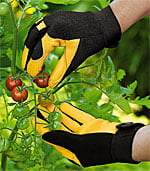Growing Older, Growing Smarter
The right tools make sure gardening is within reach at any age
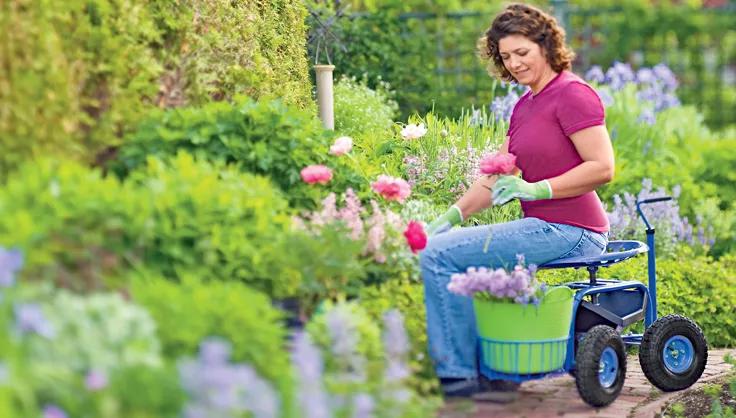 Gardening is easier when you can sit, swivel and roll. Our back-saving Tractor Scoot lets you work from a seated position virtually anywhere in your yard or garden.
Gardening is easier when you can sit, swivel and roll. Our back-saving Tractor Scoot lets you work from a seated position virtually anywhere in your yard or garden.Being retired has its advantages: You have all day to spend in the garden, if you want to. But after a couple of hours, you're free to take a break. Getting holes dug, weeding flowerbeds, and tending a vegetable garden start to seem less urgent when you're 65, and not 35, and you really don't have to be back at work on Monday morning. But older people still have choices to make.
"I've had to adjust my attitude," says Dean Failor, 72, who lives in South Beach, OR, and has been gardening for half a century. He grows broccoli, sugar snap peas, and a few other crops, but he plants in raised beds now, not long rows, so the weeding is easier, and he buys produce at a local farmers' market to supplement his harvest. He grows roses, too, but he sticks to low-maintenance varieties that are suited to his climate. "There comes a time when you just have to say 'I'm not up to all that,'" Failor says. "'Easy-care' is the watchword."
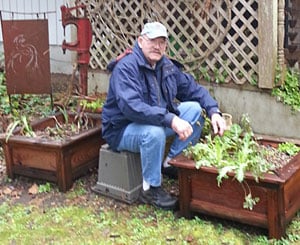 Dean Failor at his garden in South Beach, Oregon. Even in December, he has greens to harvest.
Dean Failor at his garden in South Beach, Oregon. Even in December, he has greens to harvest.Gardening is good for you, of course, and research confirms that the health benefits are striking for those who have reached the age of AARP eligibility. Routine activity — such as a little bit of gardening every day — reduces the risk of stroke and promotes a longer, healthier life, according to results of a study published last fall by the British Journal of Sports Medicine. The researchers studied a group of 4,000 60-year-olds in Stockholm, Sweden, for 12 years. Those with the highest level of daily physical activity had a 27 percent lower risk of heart attack or stroke, and a 30 percent reduced risk of death from all causes.
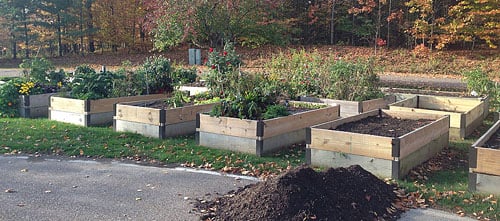 At Wake Robin, a retirement community in Vermont, residents enjoy extra-deep raised beds and no-bend gardening. The original beds, made with our Raised Bed Corners, were made deeper by adding Raised Bed Stakes.
At Wake Robin, a retirement community in Vermont, residents enjoy extra-deep raised beds and no-bend gardening. The original beds, made with our Raised Bed Corners, were made deeper by adding Raised Bed Stakes.The challenges of gardening are complicated by physical limitations as we age, but "we accommodate these changes by adding some helpful tools or altering how we go about tasks," says Barb Kreski, director of horticulture services at the Chicago Botanic Garden, where the Buehler Enabling Garden is designed to inspire older gardeners and people with physical limitations to keep their hands in the dirt. Hanging baskets are rigged on pulley systems so they can be lowered to be worked on. Levers, not knobs, are used on gates and faucets. The plantings emphasize dwarf and low-maintenance trees and shrubs.
Kreski recommends raised beds and large pots and planters, which can be worked without bending over, and tools that make gardening easier. Soaker hoses and drip-irrigation systems eliminate the effort of dragging hoses around. A garden cart lets you haul tools and supplies easily.
Paying a little more for well-made, ergonomically designed tools should be part of everyone's retirement plan. Failor uses a garden fork instead of a spade for many tasks. "Not only is the fork lighter, but it doesn't cut stuff," he says. When it comes to weeding, his favorite is the Cape Cod Weeder, a hand-held tool with a sharp, hook-shaped blade.
Scaling back is also important. "Note what you enjoy most, as well as what you dread doing," Kreski says.
Gardeners of all ages should wear a hat and sunscreen, Kreski says, and older gardeners, especially, should wear gloves. "Invest in a pair of really good gloves that you will keep on no matter what the task," she says. "Cuts and abrasions in the skin of the hands are an invitation to infection."
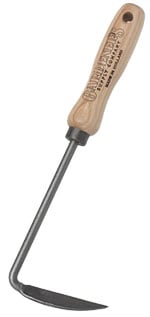 "If I had to choose one tool for the garden it would have to be the Cape Cod Weeder," Failor says.
"If I had to choose one tool for the garden it would have to be the Cape Cod Weeder," Failor says.The late Jim Wilson, co-host of The Victory Garden for 13 years and author of more than a dozen gardening books, kept at his hobby for all of his 85 years. His book, Gardening Through Your Golden Years, is full of good advice for what he called "seasoned gardeners." When he was 78, he described his approach as "slow, steady, safe, and thoughtful, … not a bad approach to any task, and especially gardening."
Wilson says that one of the things he learned was to recruit help for heavy garden jobs and mowing. He adapted his gardening style to suit his situation, and refined the plant selection in his garden.
"I would like to convince tidy gardeners that it is OK to slack off, to stop trimming shrubs into little green meatballs, to rely more on mulching and less on weeding," Wilson said. His goal was not to talk anyone into giving up gardening as they grow older, but to convince them that they should, above all, keep it up.
Print this Article:
Get the Dirt
Stay up to date on new articles and advice. Please fill out the information below.

